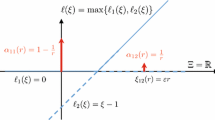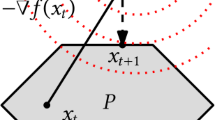Abstract
We extend the theory of penalty functions to stochastic programming problems with nonlinear inequality constraints dependent on a random vector with known distribution. We show that the problems with penalty objective, penalty constraints and chance constraints are asymptotically equivalent under discretely distributed random parts. This is a complementary result to Branda (Kybernetika 48(1):105–122, 2012a), Branda and Dupačová (Ann Oper Res 193(1):3–19, 2012), and Ermoliev et al. (Ann Oper Res 99:207–225, 2000) where the theorems were restricted to continuous distributions only. We propose bounds on optimal values and convergence of optimal solutions. Moreover, we apply exact penalization under modified calmness property to improve the results.
Similar content being viewed by others
References
Bazaraa MS, Sherali HD, Shetty CM (2006) Nonlinear programming: theory and algorithms, 3rd edn. Wiley, Singapore
Branda M (2010) Solving real-life portfolio problem using stochastic programming and Monte-Carlo techniques. In: Houda M, Friebelová J (eds) Proceedings of the 28th international conference on mathematical methods in economics 2010. University of South Bohemia, České Budějovice, pp 67–72
Branda M (2012a) Chance constrained problems: penalty reformulation and performance of sample approximation technique. Kybernetika 48(1):105–122
Branda M (2012b) Sample approximation technique for mixed-integer stochastic programming problems with several chance constraints. Oper Res Lett 40(3):207–211
Branda M (2012c) Stochastic programming problems with generalized integrated chance constraints. Optim J Math Program Oper Res 61(3):949–968
Branda M, Dupačová J (2012) Approximations and contamination bounds for probabilistic programs. Ann Oper Res 193(1):3–19
Burke JV (1991a) Calmness and exact penalization. SIAM J Control Optim 29:493–497
Burke JV (1991b) An exact penalization viewpoint of constrained optimization. SIAM J Control Optim 29:968–998
D’Ambrosio C, Lodi A (2011) Mixed integer nonlinear programming tools: a practical overview. 4OR Q J Oper Res 9:329–349
Clarke FH (1983) Optimization and nonsmooth analysis. Wiley, New York
Dupačová J, Gaivoronski A, Kos Z, Szantai T (1991) Stochastic programming in water management: a case study and a comparison of solution techniques. Eur J Oper Res 52:28–44
Ermoliev YM, Ermolieva TY, Macdonald GJ, Norkin VI (2000) Stochastic optimization of insurance portfolios for managing exposure to catastrophic risks. Ann Oper Res 99:207–225
Klein Haneveld WK (1986) Duality in stochastic linear and dynamic programming. Lecture notes in economics and mathematical systems, vol 274. Springer, New York
Klein Haneveld WK, van der Vlerk M (2006) Integrated chance constraints: reduced forms and an algorithm. Comput Manag Sci 3(4):245–269
Hoheisel T, Kanzowa Ch, Outrata JV (2010) Exact penalty results for mathematical programs with vanishing constraints. Nonlinear Anal 72:2514–2526
Koch T, Ralphs T, Shinano Y (2012) Could we use a million cores to solve an integer program? Math Methods Oper Res 76(1):67–93
Luedtke J, Ahmed S (2008) A sample approximation approach for optimization with probabilistic constraints. SIAM J Optim 19:674–699
Nocedal J, Wright SJ (2006) Numerical optimization, 2nd edn. Springer, New York
Meskarian R, Xu H, Fliege J (2012) Numerical methods for stochastic programs with second order dominance constraints with applications to portfolio optimization. Eur J Oper Res 216:376–385
Prékopa A (1995) Stochastic programming. Kluwer Dordrecht and Académiai Kiad, Budapest
Prékopa A (2003) Probabilistic programming. In: Ruszczynski A, Shapiro A (eds) Stochastic programming handbook in operations research and management science, vol 10. Elsevier, Amsterdam, pp 483–554
Raike WM (1970) Dissection methods for solutions in chance constrained programming problems under discrete distributions. Manag Sci 16(11):708–715
Rockafellar RT, Wets R (2004) Variational analysis, 2nd edn. Springer, Berlin
Shapiro A (2003) Monte Carlo sampling methods. In: Ruszczynski A, Shapiro A (eds) Stochastic programming, handbook in operations research and management science, vol 10. Elsevier, Amsterdam, pp 483–554
Xu H, Zhang D (2012) Monte Carlo methods for mean-risk optimization and portfolio selection. Comput Manag Sci 9(1):3–29
Wang W, Ahmed S (2008) Sample average approximation of expected value constrained stochastic programs. Oper Res Lett 36(5):515–519
Žampachová E, Mrázek M (2010) Stochastic optimization in beam design and its reliability check. In: MENDEL 2010—16th international conference on soft computing. Mendel Journal series. Brno, FME BUT, pp 405–410
Acknowledgments
The research was supported by the Czech Science Foundation under the Grant (P402/12/G097).
Author information
Authors and Affiliations
Corresponding author
Rights and permissions
About this article
Cite this article
Branda, M. On relations between chance constrained and penalty function problems under discrete distributions. Math Meth Oper Res 77, 265–277 (2013). https://doi.org/10.1007/s00186-013-0428-7
Received:
Accepted:
Published:
Issue Date:
DOI: https://doi.org/10.1007/s00186-013-0428-7
Keywords
- Penalty functions
- Chance constraints
- Asymptotic equivalence
- Discrete distribution
- Exact penalization
- Calmness




